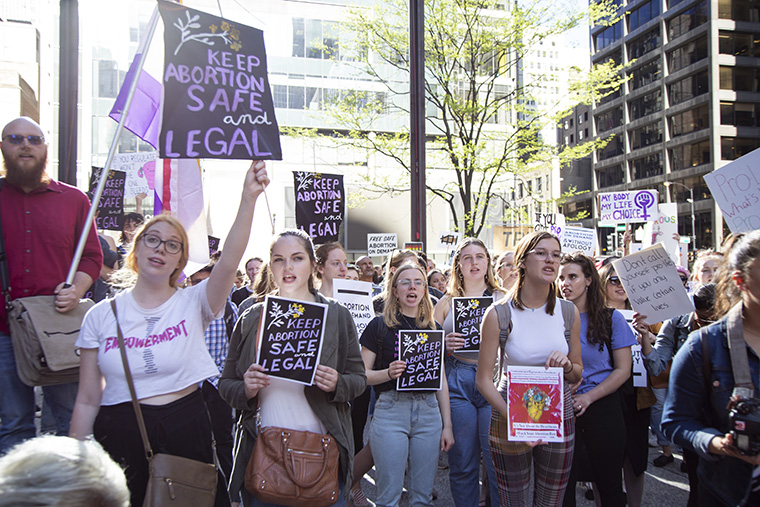‘GOP, hands off me’: Chicago rallies against abortion bans
May 24, 2019
On Thursday night, people of all races, ages and genders showed up at Daley Plaza to rally against the abortion bans that have been cropping up across the country.
Most recently, on May 14, Alabama signed a bill into law that effectively bans all abortions, with the only exception being if the pregnant person’s life is at risk. Georgia, Ohio, Kentucky and Mississippi all recently passed “heartbeat bills” that ban abortion after six weeks. Some of the laws also include legal consequences including prison time for people who receive abortions in Georgia, as well as the doctors who perform them in Alabama.
The rally at Daley Plaza, 50 W. Washington St., was organized by Kelly Hayes, a member of grassroots activist organization Lifted Voices. The event was intentionally intersectional, highlighting the experiences of people of different genders and races. At one point, the crowd even changed a gendered chant about women to be about “people,” to ensure inclusivity.
“We’re all here today because we’re angry,” Hayes said. “Some of us might be here because we’re afraid. But we’re all here because we’re ready. We’re ready to fight, we’re ready to learn, we’re ready to build. And if we mobilize like I know we can, I promise you the Republicans are not ready for us.”
Hayes mentioned groups that offer resources to those seeking safe, accessible abortions such as the Chicago Clinic Escorts, the Chicago Abortion Fund and the Midwest Access Coalition. She recommended people seek out these organizations to find ways they can offer their time and money to them, and invited leaders of those organizations to speak to the crowd about the challenges the pro-choice movement is currently facing.
“Although Roe [v. Wade] has been law of the land … for many years … [states] have been working very hard and very creatively to make sure that [abortion] access isn’t actually available to many, many people,” said Diana Parker, director of community relations for the Midwest Access Coalition. “And as always, that usually falls hard on people who have been historically ignored [and] kept from resources—so our clients are people of color, low-income folk, queer folk and the majority of our clients are also parents who are trying to provide sustainable and safe lives for their children.”
Others shared their personal stories, including a woman named Crystal, who was working two jobs and had no health insurance when she found out she was pregnant. She was only able to afford her abortion through the help of the Chicago Abortion Fund, she said.
Pounding drums and the sound of distant shouts from across the plaza provided background for the speeches as pro-life counter protesters made their presence known.
Kelly Trzmielewski, a nursing student with aspirations to become a pro-life midwife, was among the counter protesters and said she supports the recent legislation passed and hopes that it will mean Roe v. Wade—the 1973 Supreme Court decision that ensured the constitutional right to safe and legal abortion—will be overturned.
The intention to overturn Roe v. Wade is something which several legislators, including Alabama state Rep. Terri Collins (R), who sponsored the Alabama abortion ban, have been vocal about. Collins told The Washington Post that though she has empathy for victims of rape and incest, she did not include exceptions to those situations in the Alabama bill, which would force federal courts to intervene, bring the case in front of the Supreme Court and call Roe v. Wade into question.
“We’re all human,” Trzmielewski said, “so why is it legal to kill a baby? I just don’t get it. It disappoints me.”
Trzmielewski, however, was not aware that Alabama, Georgia, Missouri, Louisiana, Mississippi and Ohio—which have all passed restrictive abortion bans recently—also all have some of the highest infant mortality rates in the country, with rates in each of these states higher than the national average. All of these states, except Ohio and Louisiana, also declined to expand Medicaid under the Affordable Care Act, leaving a large number of pregnant people without health care, according to NBC News.
One rally attendee, Julie Horowitz-Jackson, stood quietly to the side of the speakers with a sign that read, “GOP, hands off me.”
“I’ve been fighting since 1989, and I can’t believe that we’re here again,” she said. “I have a great aunt who had a back alley abortion at the age of 56, because who on earth gets pregnant at the age of 56? She had nowhere to go. [So] I’ve always grown up knowing there’s always going to be a woman standing by my side who’s going to provide for me—just like I’m going to do for those women ahead of me.”








